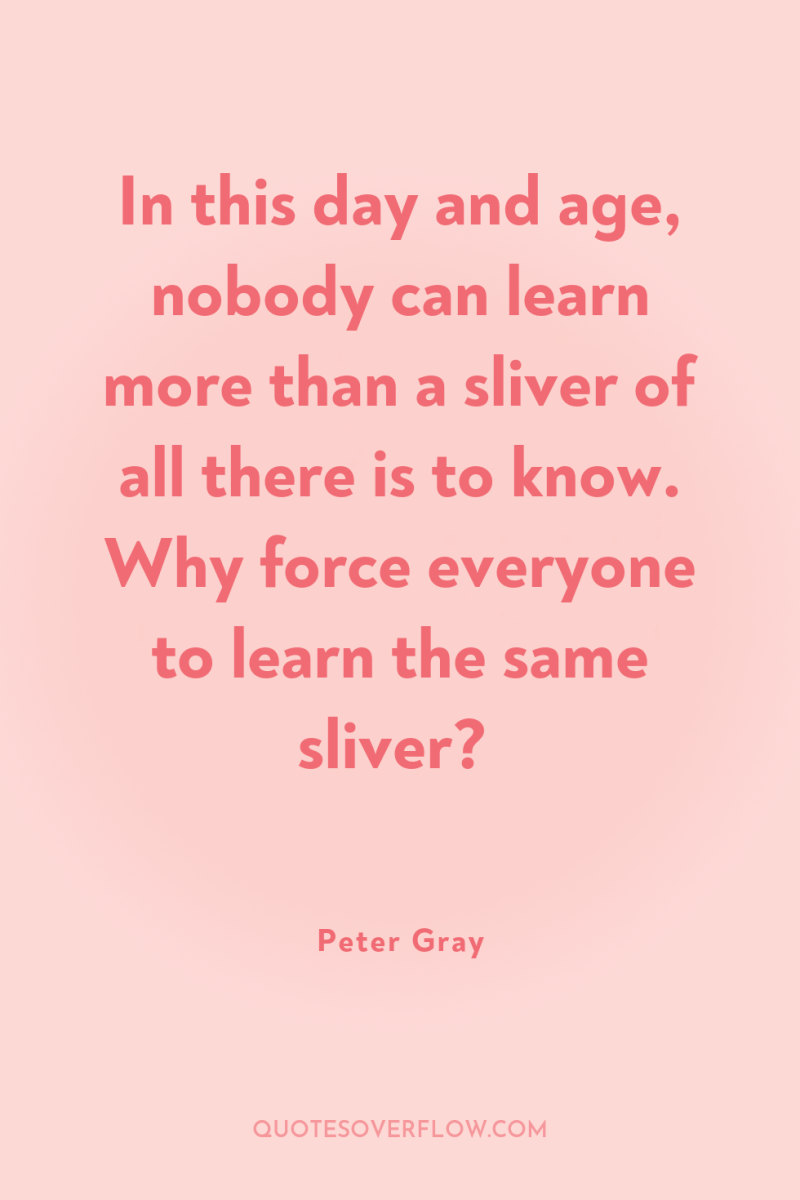
1
In this day and age, nobody can learn more than a sliver of all there is to know. Why force everyone to learn the same sliver?Peter Gray
2
People naturally want to make sense of their world. That, to Greenberg, is the essence of human curiosity. As they strive to answer questions that truly interest them, people are automatically motivated to use any resources that help them to address those questions. But the questions that interest one person do not necessarily interest another, and the resources that are helpful to one are not necessarily helpful to another. .Peter Gray
3
Once compulsory systems of state-run schools were established, they became increasingly standardized, both in content and in method. For the sake of efficiency, children were divided into separate classrooms by age and passed along, from grade to grade, like products on an assembly line. The task of each teacher was to add bits of officially approved knowledge to the product, in accordance with a preplanned schedule, and then to test that product before passing it on to the next station.Peter Gray
4
Agriculture brought to human beings more than a new way of procuring food. It introduced a new way of thinking about the relationship between humans an nature. Hunter-gatherers considered themselves to be part of the natural world; they lived with nature, not against it. They accepted nature`s twist and turns as inevitable and adapted to them as best they could. Agriculture, on the other hand, is a continuous exercise in controlling nature; it involves the taming and controlling of plants and animals, to make them servants to humans rather than equal partners in the natural world. With agriculture, I suggest, humans began to extend this idea of control over nature to other aspects of the natural world, including children.Peter Gray
5
Schooling that children are forced to endure–in which the subject matter is imposed by others and the “learning” is motivated by extrinsic rewards and punishments rather than by the children’s true interests–turns learning from a joyful activity into a chore, to be avoided whenever possible. Coercive schooling, which tragically is the norm in our society, suppresses curiosity and overrides children’s natural ways of learning. It also promotes anxiety, depression and feelings of helplessness that all too often reach pathological levels.Peter Gray
6
Everyone who has ever been to school knows that school is prison, but almost nobody beyond school age says it is. It's not polite. We all tiptoe around the truth because admitting it would make us seem cruel and would point a finger at well-intentioned people doing what they believe to be essential. A prison, according to the common, general definition, is any place of involuntary confinement and restriction of liberty. In school, as in adult prisons, the inmates are told exactly what they must do and are punished for failure to comply. Actually, students in school must spend more time doing exactly what they are told than is true of adults in penal institutions. Another difference, of course, is that we put adults in prison because they have committed a crime, while we put children in school because of their age.Peter Gray